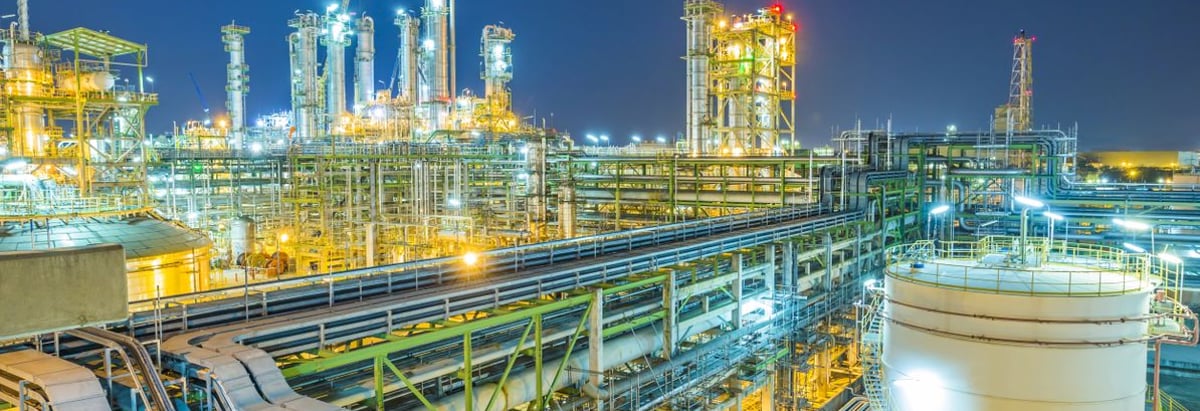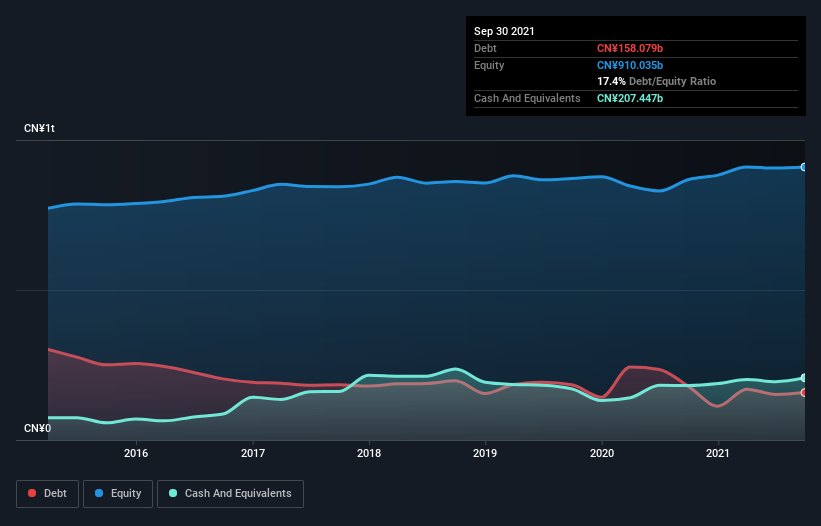
The external fund manager backed by Berkshire Hathaway's Charlie Munger, Li Lu, makes no bones about it when he says 'The biggest investment risk is not the volatility of prices, but whether you will suffer a permanent loss of capital.' So it seems the smart money knows that debt - which is usually involved in bankruptcies - is a very important factor, when you assess how risky a company is. We can see that China Petroleum & Chemical Corporation (HKG:386) does use debt in its business. But is this debt a concern to shareholders?
What Risk Does Debt Bring?
Generally speaking, debt only becomes a real problem when a company can't easily pay it off, either by raising capital or with its own cash flow. In the worst case scenario, a company can go bankrupt if it cannot pay its creditors. However, a more common (but still painful) scenario is that it has to raise new equity capital at a low price, thus permanently diluting shareholders. Having said that, the most common situation is where a company manages its debt reasonably well - and to its own advantage. The first thing to do when considering how much debt a business uses is to look at its cash and debt together.
Check out our latest analysis for China Petroleum & Chemical
What Is China Petroleum & Chemical's Debt?
You can click the graphic below for the historical numbers, but it shows that China Petroleum & Chemical had CN¥158.1b of debt in September 2021, down from CN¥177.9b, one year before. However, its balance sheet shows it holds CN¥207.4b in cash, so it actually has CN¥49.4b net cash.

How Strong Is China Petroleum & Chemical's Balance Sheet?
According to the last reported balance sheet, China Petroleum & Chemical had liabilities of CN¥637.8b due within 12 months, and liabilities of CN¥339.4b due beyond 12 months. Offsetting this, it had CN¥207.4b in cash and CN¥83.8b in receivables that were due within 12 months. So its liabilities total CN¥686.0b more than the combination of its cash and short-term receivables.
Given this deficit is actually higher than the company's massive market capitalization of CN¥494.1b, we think shareholders really should watch China Petroleum & Chemical's debt levels, like a parent watching their child ride a bike for the first time. Hypothetically, extremely heavy dilution would be required if the company were forced to pay down its liabilities by raising capital at the current share price. Given that China Petroleum & Chemical has more cash than debt, we're pretty confident it can handle its debt, despite the fact that it has a lot of liabilities in total.
Better yet, China Petroleum & Chemical grew its EBIT by 405% last year, which is an impressive improvement. If maintained that growth will make the debt even more manageable in the years ahead. There's no doubt that we learn most about debt from the balance sheet. But ultimately the future profitability of the business will decide if China Petroleum & Chemical can strengthen its balance sheet over time. So if you want to see what the professionals think, you might find this free report on analyst profit forecasts to be interesting.
But our final consideration is also important, because a company cannot pay debt with paper profits; it needs cold hard cash. While China Petroleum & Chemical has net cash on its balance sheet, it's still worth taking a look at its ability to convert earnings before interest and tax (EBIT) to free cash flow, to help us understand how quickly it is building (or eroding) that cash balance. In the last three years, China Petroleum & Chemical's free cash flow amounted to 38% of its EBIT, less than we'd expect. That's not great, when it comes to paying down debt.
Summing up
Although China Petroleum & Chemical's balance sheet isn't particularly strong, due to the total liabilities, it is clearly positive to see that it has net cash of CN¥49.4b. And it impressed us with its EBIT growth of 405% over the last year. So we don't have any problem with China Petroleum & Chemical's use of debt. There's no doubt that we learn most about debt from the balance sheet. But ultimately, every company can contain risks that exist outside of the balance sheet. For example, we've discovered 2 warning signs for China Petroleum & Chemical (1 is concerning!) that you should be aware of before investing here.
Of course, if you're the type of investor who prefers buying stocks without the burden of debt, then don't hesitate to discover our exclusive list of net cash growth stocks, today.
New: AI Stock Screener & Alerts
Our new AI Stock Screener scans the market every day to uncover opportunities.
• Dividend Powerhouses (3%+ Yield)
• Undervalued Small Caps with Insider Buying
• High growth Tech and AI Companies
Or build your own from over 50 metrics.
Have feedback on this article? Concerned about the content? Get in touch with us directly. Alternatively, email editorial-team (at) simplywallst.com.
This article by Simply Wall St is general in nature. We provide commentary based on historical data and analyst forecasts only using an unbiased methodology and our articles are not intended to be financial advice. It does not constitute a recommendation to buy or sell any stock, and does not take account of your objectives, or your financial situation. We aim to bring you long-term focused analysis driven by fundamental data. Note that our analysis may not factor in the latest price-sensitive company announcements or qualitative material. Simply Wall St has no position in any stocks mentioned.
About SEHK:386
China Petroleum & Chemical
An energy and chemical company, engages in the oil and gas and chemical operations in Mainland China, Singapore, and internationally.
Good value with adequate balance sheet and pays a dividend.


